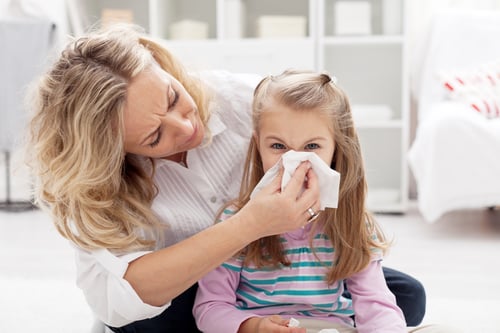DRUGS
French parents warned most children’s over-the-counter medicines ‘useless or dangerous’
Most children's medication that you can buy over the counter is either useless and could even be dangerous for their health, a study by a French consumer group has concluded.
Published: 22 February 2018 10:37 CET

Photo: ilona75/Depositphotos
It's natural for worried parents to want to soothe their ailing children with over-the-counter medicine from a pharmacy but a leading French consumer group says they should think twice.
According to French consumer group UFC Que Choisir “too many” children's medicines for coughs, colds, regurgitation and gastric reflux are “useless or dangerous”.
And the group warned against getting children into “the harmful habit of taking medication every day” in its recent issue which includes a list of the particular products to avoid.
Included on the list are mucus thinners such as acetylcysteine and carbocisteine in powder form, as well as Fluimucil 2% for children and Bronchokod for children, which also include these drugs.
All of the above treatments, which are sold over-the-counter, can actually increase congestion in the under-twos and there is no evidence that they have any effect for older children, according to the group.
Similarly, it is better to avoid antiseptic sprays that “do no better than salt water solutions” and can even cause irritation and allergies.
READ ALSO:
Photo: The Local
The group also recommends parents avoid using decongestant sprays which they say should not be prescribed to the under-15s and instead advises using salt water for cleaning a child's nose.
On top of that cough syrups containing codeine also make the list of products to be avoided.
Before trying to calm a cough which is a symptom of an illness, the groups recommends first consulting a doctor to find out the cause.
It also addresses drugs used to treat regurgitation which about 30 percent of children under the age of one suffer from.
Even though in the majority of cases it's nothing to worry about and France's health authorities have advised against using medicine to treat the condition since 2016, the group says drugs are still used too often.
Medical professionals, who have come out in support of the blacklist, say that rather than go straight for the medicine bottle it's much better to see a doctor or pharmacist to find out what can be done without drugs.
“In general, coughs, fever, cold, etc. are not serious and most of the drugs on sale for these situations are useless or at least more dangerous than useful,” Dr. Bruno Toussaint, editorial director of an independent medical journal said, adding that the UFC-que Choisir list was “very useful”.
And the consumer group doesn't suggest avoiding all medicines, recommending paracetamol (in the form of Doliprane syrup) to treat fever, saline treatments for the nose in case of colds and rehydration solutions in case of diarrhea.
Url copied to clipboard!




 Please whitelist us to continue reading.
Please whitelist us to continue reading.